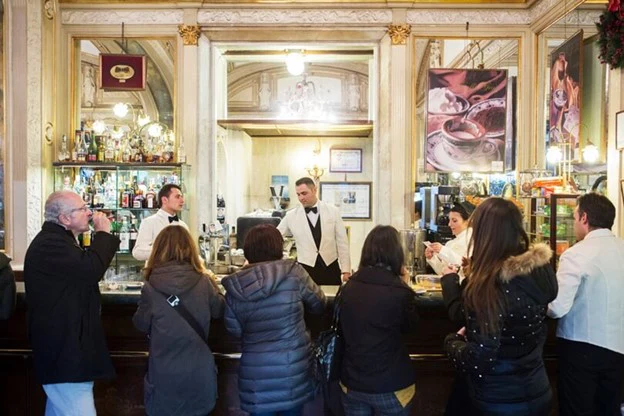
Coffee is an important daily ritual for millions across the globe. This explains why it’s the second most traded commodity in the world after oil.
Coffee does not have any roots in Italy which begs this question: Why are so many coffee lovers ordering those beverages in Italian? From lattes to cappuccinos, people are rolling Italian words off their tongues. So, how did Italian become the international language of coffee?
How did coffee get to Italy?
From its origin in Ethiopia, coffee Arabica spread through the Ottoman Empire before reaching Europe, where the first coffee houses were becoming established. The 17th century saw the opening of the very first European coffeehouse in Venice, which later spawned over two hundred others along its canals.
By 1763 Venice solely had over 200 coffee shops. There was, of course, a backlash against the bean, with the Catholic church initially labelling it as the “Devil’s Drink” – and Pope Clement VIII was asked to – publicly denounce the coffee. In a moment of clarity where Pope gave it his blessing after trying the drink himself and said, “This Satan’s drink is so delicious that it would be a pity to let the infidels have exclusive use of it.” With the Pope’s approval, Italian coffee culture was not only born but blessed.
The invention of Espresso: The cornerstone of Italian Coffee Culture

By the 20th century, things started to kick off, and Italy truly emerged as the global leader in coffee, thanks to Milanese engineer Luigi Bezzera. In 1901, Bezzera came up with the idea of forcing pressurized water through a small puck of ground coffee to produce a concentrated, strong beverage. His idea of the shot which was named espresso due to the express nature of its brewing, as it can be made- in mere seconds, was a stroke of genius.
By the time espresso reached its final form, coffee culture had adapted to meet it. The espresso machines found their place in saloon-style coffee bars, places where patrons could stand at the bar, sip their espresso, and catch up with the newspaper. This brought about the term barista, which was coined to refer to the barmen making the coffee.

By the mid-1900s, most baristas were able to provide- a variety of coffee drinks such as cappuccinos, macchiatos, and caffè latte, by mixing espresso with different amounts of warmed or frothed milk. Economic booms around the same time meant that Italians were spending more time outside their homes, and bars became a place to grab a pastry for breakfast or a bite to eat later in the day.
Bialetti’s Moka pot: Espresso at home
Engineer Alfonso Bialetti took this popular new coffee style- and combined it with the Italian ideal of “coffee for all” to create the Moka pot in 1933, the first stovetop espresso machine for home purpose. His simple yet effective design allowed anyone to make a rich, espresso-style coffee from the comfort of their kitchen.

The Moka pot became so popular, that it is hard to find an Italian household without one today. It has been replicated and adopted throughout the world. The design hasn’t changed in almost a century, and although there are many knockoffs available, Bialetti is still the most well-known and trusted brand.
Pride in Coffee culture
Italian coffee offers a surprising tone in terms of its complexity and richness in flavour. Once you sip an Italian heavily roasted coffee with its bittersweet tones, you will understand why Italians love their coffee.
In Italy, coffee is served- with a glass of water. It is not a customary act around the globe, but it is part of the experience- when it comes to a good cup of coffee. This is simply used to cleanse the palate before drinking the coffee. After all, having more than seven espressos in Italy per day is not unusual.
Italians take pride in their coffee seriously. The coffee from a machine is not just a machine-made drink, it is a source of pride for Italians due to the engineering tradition of their industry-standard espresso machine.

Caffè Florian: World’s oldest café in Venice, Italy.
Whether or not you enjoy their bitter style of espresso, you must respect their steadfast belief that coffee should be readily available to everyone, regardless of income or social status. It is not likely to find many artisanal shops popping up anytime soon, but it is easier to find an authentic Italian espresso almost anywhere in Italy, and it will never be expensive.
Why choose real Italian coffee?
Italian coffee- benefits from its strong identity, which is well-connected with the Italian lifestyle, various Italian philosophies on coffee, and more generally, Italian-ness. This allows it to obtain a significant market niche – those who want to differentiate themselves from the main competitors.
Those who choose Italian coffee today, often do it because they want to differentiate themselves in their market, especially from large international chains and third wave bars to tell an authentic story, both in cultural and product terms.
Don Carlos takes pride in its rich and authentic Italian coffee products. Don Carlos coffee is not just a coffee, it is an infinite history of quality, taste, and innovation, starting from Italy and reaching the land of smiles – Thailand.
Discover lots of Italian coffee varieties and choose the one you like from our store.